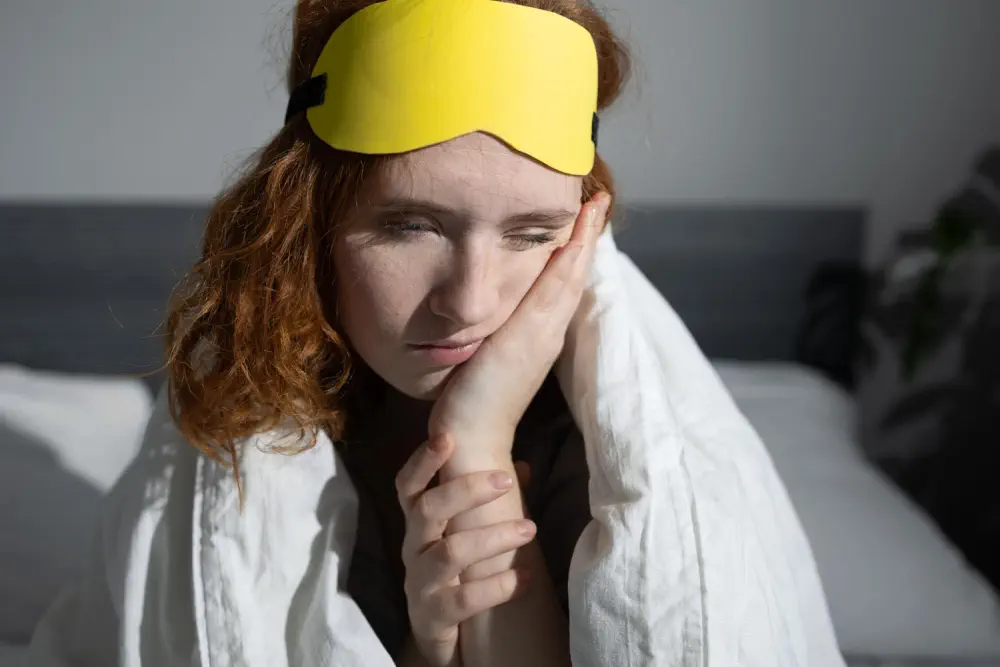We offer medical detox and multiple addiction treatment options in our
luxury treatment centres in Port Hope, Cobourg, and Ottawa.
Dangers of Mixing Mirtazapine and Alcohol
You've been taking mirtazapine (brand name Remeron) for depression, and things are starting to feel better. Tonight, friends are coming over for dinner, and you're wondering if one glass of wine would be okay. The answer is definitely no. Mirtazapine and alcohol don't just add to each other's effects — they multiply them. What feels like a small drink can suddenly become dangerous, slowing your breathing and putting you at real risk of a medical emergency.
Key Takeaways
- Brain Chemistry Clash: Both substances slow your nervous system, multiplying dangerous effects
- Treatment Sabotage: Alcohol blocks mirtazapine from working, worsening depression
- Withdrawal Problems: Alcohol use makes stopping mirtazapine much more difficult
- Emergency Risk: Breathing issues or extreme drowsiness require immediate medical care
- Vulnerable Groups: Older adults and those with health conditions face higher risks
- Professional Help: Medical supervision prevents dangerous interactions and complications
What Makes This Combination So Dangerous?
Your brain runs on a delicate balance of chemicals. Mirtazapine works by boosting two specific ones: serotonin and norepinephrine. Think of these as your brain's mood regulators and energy controllers. When levels get too low, depression sets in.
Alcohol throws a wrench into this system. While mirtazapine tries to lift your mood by increasing these brain chemicals, alcohol pushes everything in the opposite direction. It's like having someone step on the gas while another person slams the brakes.
But here's where things get really dangerous. Most people think combining substances means their effects just add together. One plus one equals two. That's not what happens with mirtazapine and alcohol. Instead, they multiply each other's impact on your central nervous system. One plus one suddenly becomes four or five.

What Happens to Your Central Nervous System?
Your central nervous system controls everything that keeps you alive. Breathing, heart rate, staying conscious — it's all managed here. Mirtazapine has sedating effects as a side effect. Alcohol does, too. When you mix them, both substances compete to slow down these vital functions.
Your breathing becomes shallow. Your heart rate drops. Your blood pressure can plummet. What starts as feeling "relaxed" can quickly become an inability to stay awake or even breathe properly. This isn't just feeling drowsy after a big meal — this is your body's life support systems slowing down to dangerous levels.
This can happen even if you're not a heavy drinker. Someone who normally handles alcohol just fine might find themselves in serious trouble after just one or two drinks while on mirtazapine.
Immediate Physical Risks You Need to Know

The effects don't wait around. Within minutes of drinking while on mirtazapine, your body starts reacting. What you experience depends on how much you've had and how your body processes both substances.
- Mild Effects (First 30-60 minutes): Your coordination starts getting wobbly, like your brain and muscles aren't talking to each other properly. Walking feels unsteady. Simple tasks like texting become frustrating because your fingers won't do what you want. You might feel dizzy when you stand up as your blood pressure dips. These early signs happen because both substances are depressing your nervous system's ability to control fine motor skills.
- Moderate Effects (1-3 hours): Now the sedation really kicks in. You're fighting to keep your eyes open, but it's not normal tiredness. Your thinking gets foggy — conversations become hard to follow, and making decisions feels impossible. Mirtazapine and alcohol side effects compound here as your liver struggles to process both substances simultaneously. Your body temperature regulation gets thrown off, leaving you feeling either too hot or too cold.
- Severe Effects (Can happen at any point): This is where things become life-threatening. Your breathing slows down significantly, maybe only 8-10 breaths per minute instead of the normal 12-20. Your heart rate drops dangerously low. You might vomit while barely conscious, creating a choking risk. Some people experience what looks like a coma — they're breathing but completely unresponsive.
Here's what many people don't realize: the jump from "moderate" to "severe" can happen fast. Your body doesn't give you a 30-minute warning. One moment you're feeling drowsy at dinner, the next your friends can't wake you up.
The mechanism behind this sudden shift involves your liver. It's working overtime trying to break down both substances. When it gets overwhelmed, levels of both mirtazapine and alcohol spike in your bloodstream. That multiplicative effect we talked about earlier suddenly accelerates, and your central nervous system can't keep up with the suppression.
The Hidden Mental Health Consequences
The very reason you're taking mirtazapine (to treat depression) gets sabotaged when you add alcohol to the mix. Your brain chemistry becomes a battleground where these substances work against each other. Mirtazapine spends weeks carefully adjusting your serotonin and norepinephrine levels. Alcohol comes in like a wrecking ball, disrupting all that progress in hours. The Centre for Addiction and Mental Health reports that by age 40, one in two Canadians will have experienced a mental illness, with recent Statistics Canada data showing that 18.3% of Canadians meet criteria for a mood, anxiety, or substance use disorder in any given year. Many of these individuals receive antidepressants like mirtazapine. When alcohol interferes with treatment effectiveness, it doesn't just affect the individual — it impacts families, workplaces, and healthcare systems.

Why Your Depression Treatment Stops Working
Your depression treatment stops working because alcohol blocks mirtazapine from doing its job. That's the simple answer. Think of mirtazapine as slowly building a bridge over the chemical imbalance causing your depression. Each day of consistent medication use adds another plank to that bridge. Alcohol acts like a flood that washes away weeks of progress overnight.
Your brain gets confused signals. Mirtazapine says: "increase these mood chemicals," while alcohol says: "shut everything down." The result? Your depression symptoms often return with a vengeance. Sleep problems get worse. Anxiety spikes. The hopelessness that mirtazapine was helping you manage comes flooding back.
Even worse, this pattern can create a dangerous cycle. Your depression worsens, so you might drink more to cope. More alcohol makes the depression worse, which makes you want to drink more. Breaking this cycle becomes exponentially harder once it starts.
Mirtazapine Withdrawal Complications From Alcohol Use
Stopping mirtazapine withdrawal becomes far more complex when alcohol has been part of it. Your brain has been dealing with two different substances affecting its chemistry, and now it has to readjust to functioning without either one.
Most people don't realize how alcohol use during mirtazapine treatment sets them up for a rougher withdrawal experience. When you drink regularly while taking mirtazapine, your brain makes additional adaptations beyond what the medication alone requires. It's like your nervous system has been juggling two balls instead of one, and suddenly both get taken away.
The timing creates particular challenges. If you've been drinking while on mirtazapine and decide to stop both substances, your withdrawal symptoms can be unpredictable and more severe. Your doctor might need to address the alcohol dependence first, or taper the mirtazapine more slowly, or manage both simultaneously — each approach has its own risks and benefits.
The Double Withdrawal Dilemma
Trying to come off both mirtazapine and alcohol at the same time? That's a tough road your body wasn't designed to handle alone. You're asking your brain to readjust to life without two different chemical supports it's gotten used to. The symptoms from each withdrawal can feed off of each other, making everything worse.
Here's what makes this so tricky:
- You can't tell what's causing what: Anxiety, lousy sleep, mood swings — both withdrawals cause these same problems, so you never know if it's the alcohol, the mirtazapine, or both making you feel awful
- It takes way longer than expected: Forget that neat 2 to 4 week timeline for mirtazapine withdrawal. Now you're looking at months of ups and downs as your brain sorts through getting off both substances
- Depression can get scary: Losing both supports at once sometimes triggers really dark thoughts that come out of nowhere. This is the kind of thing that needs someone watching over you
- Your body rebels in dangerous ways: Alcohol withdrawal can cause seizures or mess with your blood pressure. Mirtazapine has its own physical surprises. Put them together, and you need medical backup
- You'll want to give up: When withdrawal drags on for months instead of weeks, lots of people cave and go back to using just to make it stop. That's totally understandable, but keeps you stuck
- Even doctors get confused: Figuring out what medications might help gets complicated when they're dealing with two different withdrawal processes happening at once
The most dangerous aspect of this double withdrawal involves unpredictability. You might feel okay for a few days, then suddenly experience severe symptoms that seem to come out of nowhere. This rollercoaster effect discourages many people from completing the withdrawal process, leading them back to using one or both substances.
Are Some People More At Risk?

Not everyone faces the same level of danger when mixing mirtazapine and alcohol. Certain groups carry higher risks due to how their bodies process these substances, their overall health status, or their personal history with addiction. Understanding these differences can help you make more informed decisions about your safety.
Age, health conditions, and recovery status all influence how severely the combination affects you. What might cause mild problems for a healthy 30-year-old could create a medical emergency for someone with liver problems or an older adult with slower metabolism.
| Population Group | Specific Risks | Why This Happens | Special Precautions Needed |
| Older Adults (65+) |
|
|
|
| Those with Pre-existing Conditions |
|
|
|
| People in Early Recovery |
|
|
|
Warning Signs and When to Seek Help
Your body gives you signals when something's wrong. The problem is, when you're dealing with mirtazapine and alcohol together, those signals can escalate fast. One minute you feel a bit dizzy, the next minute, your friend can't wake you up.
Most people wait too long to get help. They think symptoms will pass on their own, or they don't want to "bother" anyone. But here's the thing — medical emergencies don't wait for convenient timing. The sooner you recognize these warning signs, the better your chances of avoiding serious complications.
Sometimes friends or family spot problems before you do. Don't ignore someone who's worried about you. They might be seeing things more clearly than you can right now.
Red Flags That Demand Immediate Attention
These symptoms mean get help NOW. Don't wait around to see if they get better:
- Your breathing gets weird: Slow, shallow breaths or feeling like you can't catch your breath no matter what you do
- You can't stay awake or alert: Friends have trouble waking you up, or you feel completely disconnected from what's happening around you
- Your heart acts up: Racing, skipping beats, or feeling like it might stop. Chest pain with sweating is especially bad
- You're throwing up while barely conscious: This creates a real choking risk; you need someone watching you immediately
- You can't control your body: You can't walk without falling over, you can't sit up straight, or your arms and legs won't do what you want
- Everything spins and won't stop: Severe dizziness that doesn't get better when you lie down, or you faint when you try to stand
- Dark thoughts take over: Any ideas about hurting yourself or wanting to die, especially if you start thinking about how you'd do it
Call 911 or get someone to drive you to the emergency department. Don't drive yourself. Tell them exactly what meds you take and how much you drink. If you're helping someone else, put them on their side so they won't choke if they vomit.
Are You Developing a Dangerous Pattern?

While mirtazapine isn't considered highly addictive like opioids, some people do develop problematic relationships with it. Canadian data from addiction treatment centres shows that about 5% of people with psychoactive prescriptions report substance abuse problems. When you add alcohol to mirtazapine use, the risk of developing unhealthy patterns increases significantly.
Mirtazapine addiction typically doesn't look like what most people picture when they think of drug addiction. There's no dramatic high or obvious intoxication. Instead, it creeps up quietly. You might start taking extra pills when you're having a particularly bad day. Or you notice you feel anxious and uncomfortable when you miss a dose, even though withdrawal shouldn't start that quickly.
Alcohol complicates this picture enormously. When people drink while on mirtazapine, they often experience enhanced mood effects — the combination can temporarily make everything feel more manageable. This creates a psychological reward cycle that's hard to break. You're not just dependent on the medication anymore; you're dependent on the medication plus alcohol combination.
The danger multiplies when someone tries to self-medicate with mounting tolerance. Maybe the prescribed dose isn't working as well anymore, so they take an extra pill. Then they have a drink to "take the edge off." Before long, they're using both substances in ways their doctor never intended, chasing a feeling that becomes harder and harder to achieve.
Breaking the Cycle Safely
Getting out of this pattern requires professional help — attempting to stop both substances on your own can be dangerous and often fails. The withdrawal from both creates a complex situation your brain and body aren't equipped to handle alone.
Professional treatment for mirtazapine and alcohol dependence typically involves:
- Medical assessment and stabilization to ensure safe withdrawal from both substances
- Gradual tapering schedules designed specifically for your usage patterns and health status
- Alternative depression treatments that don't carry the same abuse potential
- Addiction counselling to address the psychological aspects of the dependence cycle
- Long-term monitoring to prevent relapse and catch problems early if they develop
Where Can You Find Safe Help in Canada?
Living in Canada means you have access to good healthcare resources, though navigating them with medication and alcohol concerns can feel overwhelming. You don't have to figure this out alone. Your family doctor is your starting point, but they might not have specialized knowledge about mirtazapine and alcohol interactions. Don't get discouraged if you need a referral to get the full picture. Many provinces offer addiction services for prescription medication concerns.
How Do We Address Complex Medication Situations?

At the Canadian Centre for Addictions, we understand that medication concerns don't fit into neat categories. Your situation might involve depression treatment that's become complicated by alcohol use. Or maybe you started drinking more while on mirtazapine, and now you're not sure which problem came first.
We don't judge these complicated situations — we help untangle them. Our team has walked alongside many Canadians dealing with similar challenges, and we know that mixing medications with alcohol often happens gradually, without anyone intending for it to become a problem.
Our approach focuses on safety first, then addressing the underlying issues that led to the problematic patterns:
- Complete medical review where we look at your entire health picture, not just the obvious problems
- Honest conversations about your actual medication and alcohol use patterns, without shame or judgment
- Coordinated care that involves your other healthcare providers, so everyone's working together
- Flexible treatment options that fit your life and responsibilities, because recovery shouldn't mean your world falls apart
- Family involvement when appropriate, because the people who care about you want to help, but often don't know how
We also work closely with your existing healthcare team. We're not trying to replace your family doctor or psychiatrist — we're here to add specialized support that makes their job easier and your recovery more successful.
What Does a Safer Future Look Like?
Mixing mirtazapine and alcohol doesn't have to define your story. Recovery starts with honest conversations — first with yourself, then with healthcare providers who understand these complex situations. Your depression treatment matters, and so does your safety. Professional help can guide you toward solutions that address both your mental health needs and any substance concerns that have developed. At CCFA, we've seen countless people successfully navigate these challenges and build healthier relationships with both their medication and alcohol. Recovery isn't about perfection; it's about finding sustainable ways to manage your health while staying safe.
FAQ
Can I have just one drink while on mirtazapine?
Even one drink can cause dangerous effects when mixed with mirtazapine. Talk to your doctor about any alcohol use.
How long do I need to wait after stopping mirtazapine before I can drink?
Mirtazapine stays in your system for several days after your last dose. Your doctor should guide this decision based on your specific situation.
What if I accidentally mixed them?
Monitor yourself closely for breathing problems, extreme drowsiness, or confusion. Contact emergency services if you experience severe symptoms.
Will my depression get worse if I stop drinking while on mirtazapine?
Your depression treatment may actually work better without alcohol interfering. Discuss concerns with your healthcare provider.
Can I switch to a different antidepressant that's safer with alcohol?
No antidepressant is completely safe with alcohol, but some interactions are less dangerous. Your doctor can discuss alternatives.
How do I tell my doctor I've been mixing these substances?
Be honest about your usage patterns — doctors need accurate information to help you safely. They're focused on your health, not judging you.






